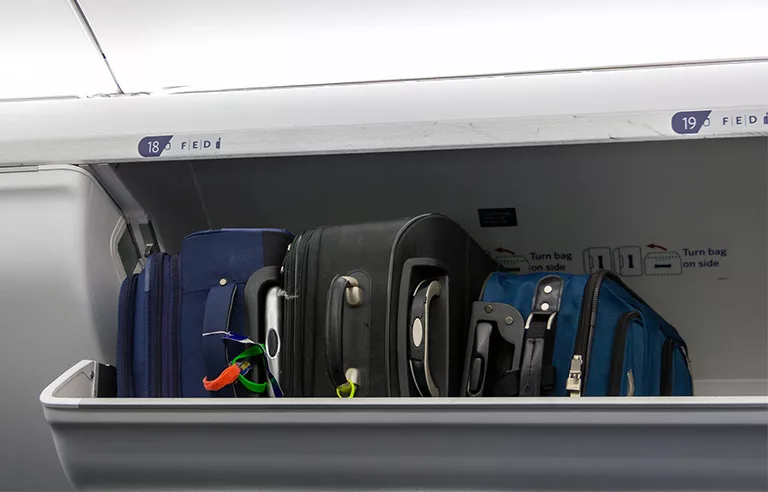
Photo: Evan Kissner/Evan’s Studio/gettyimages
Washington — The Federal Aviation Administration is warning airline operators about the hazards of passengers and crew members storing lithium batteries in overhead compartments.
According to an agency Safety Alert for Operators issued on Aug. 25, the major risk with lithium batteries – used in device power banks and portable chargers – is thermal runaway events, “which are self-sustaining uncontrolled increases in pressure and temperature.” FAA says batteries that are stored in compartments likely aren’t monitored and may not be easily accessible.
“Use of Halon extinguishers can briefly suppress open flames,” the alert states. “However, they do not halt the thermal runaway process. The primary response involves using large amounts of water to cool the battery and suppress flames. Cooling the device with water is essential to prevent the reaction from continuing until all cells have discharged their energy.”
Recommendations for operators:
- Follow safety risk management or an equivalent process to ensure all potential hazards have been identified and implement risk mitigations for carrying lithium batteries.
- Review lithium battery firefighting processes, procedures and training. Operators should:
- Ensure crew members can recognize the different lithium battery thermal runaway stages (smoke vs. flame, for example) and respond appropriately.
- Assess onboard safety equipment, such as fire extinguishers, water sources and fire-containment products, to ensure they have the capability to mitigate onboard fires from lithium batteries.
- Evaluate aircraft components, emergency equipment and passenger items that may become involved in a thermal runaway event.
- Review procedures that minimize the potential for smoke inhalation by passengers and crew members.
In addition, operators should review passenger safety messaging, including that on websites and in notification systems, cabin announcements and safety videos. The messaging should:
- Advise passengers on what lithium batteries are, where they’re found, how thermal runaway occurs and the associated risks.
- Instruct passengers and crew members to carry lithium batteries in locations where a potential thermal runaway is visible and accessible to passengers or crew members.
- Provide passengers and crew members with information on the safe handling, storage and carriage of lithium batteries, including how to prevent those batteries from being crushed or damaged.
- Educate passengers in the prevention of short-circuiting, such as storing lithium batteries in plastic bags, taping and covering terminals, or keeping lithium batteries in protective cases.
- Inform passengers to notify a crew member immediately if a lithium battery begins to overheat or smoke.
McCraren Compliance offers many opportunities in safety training to help circumvent accidents. Please take a moment to visit our calendar of classes to see what we can do to help your safety measures from training to consulting.
Original article published by Safety+Health an NSC publication


